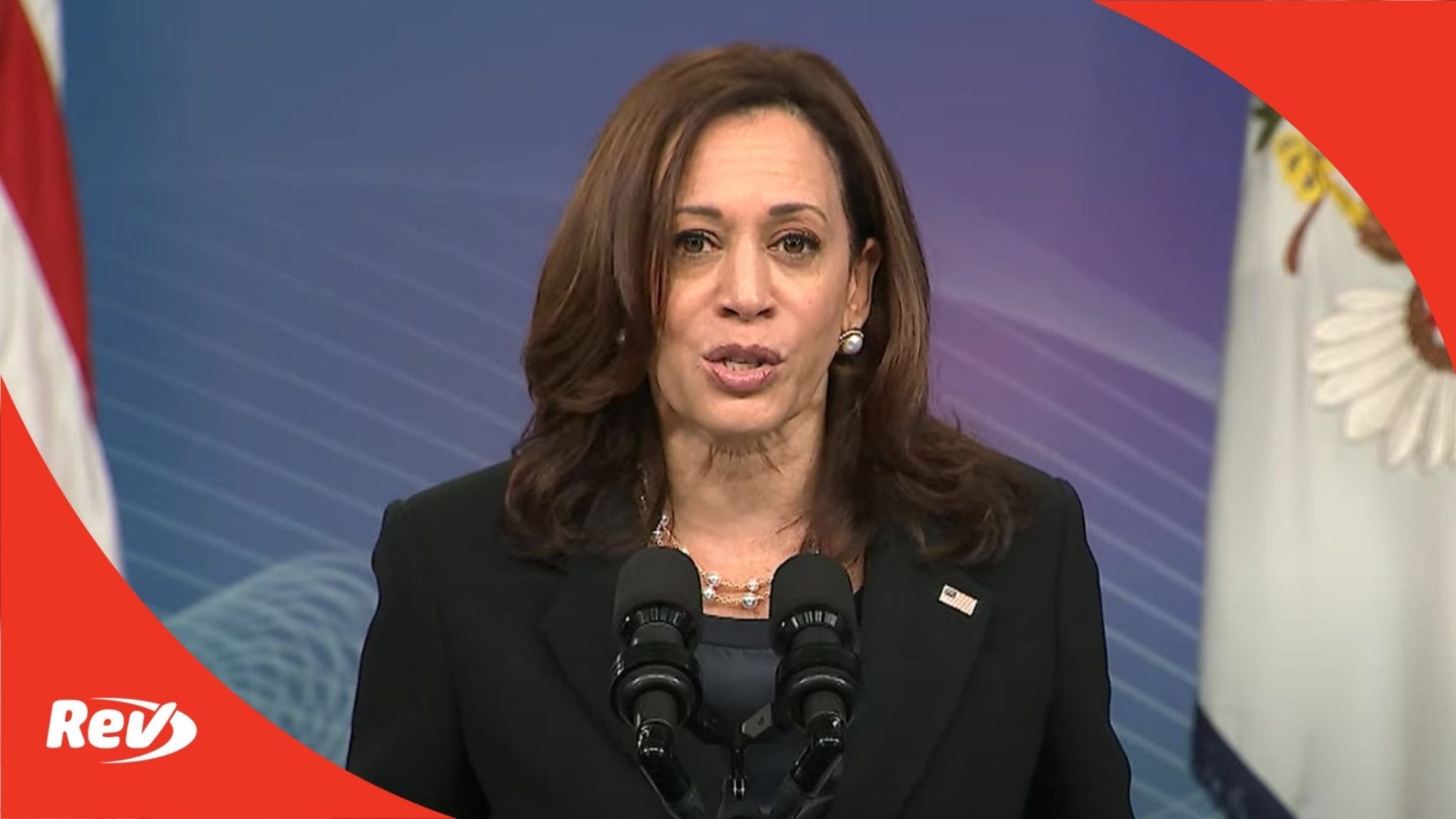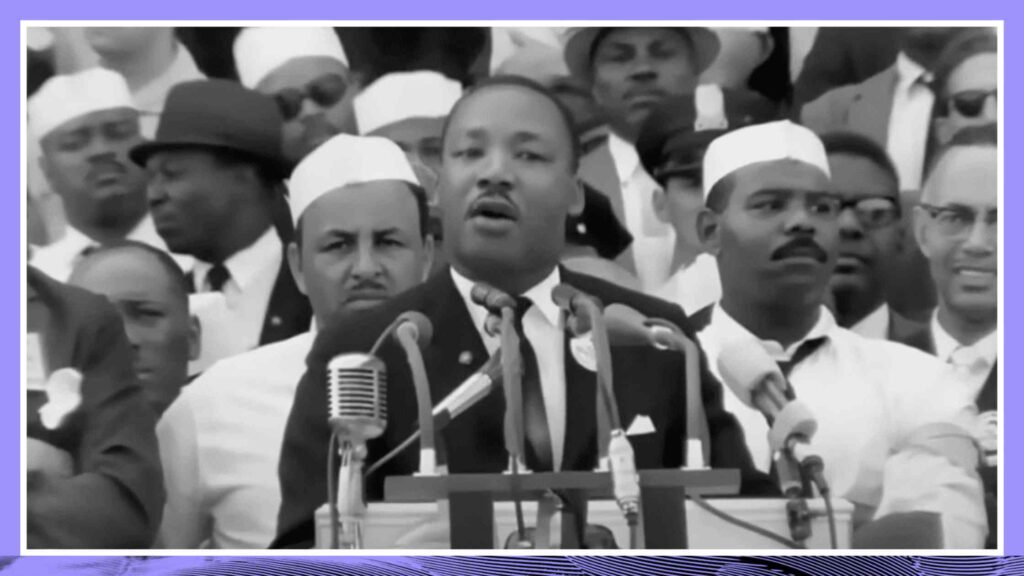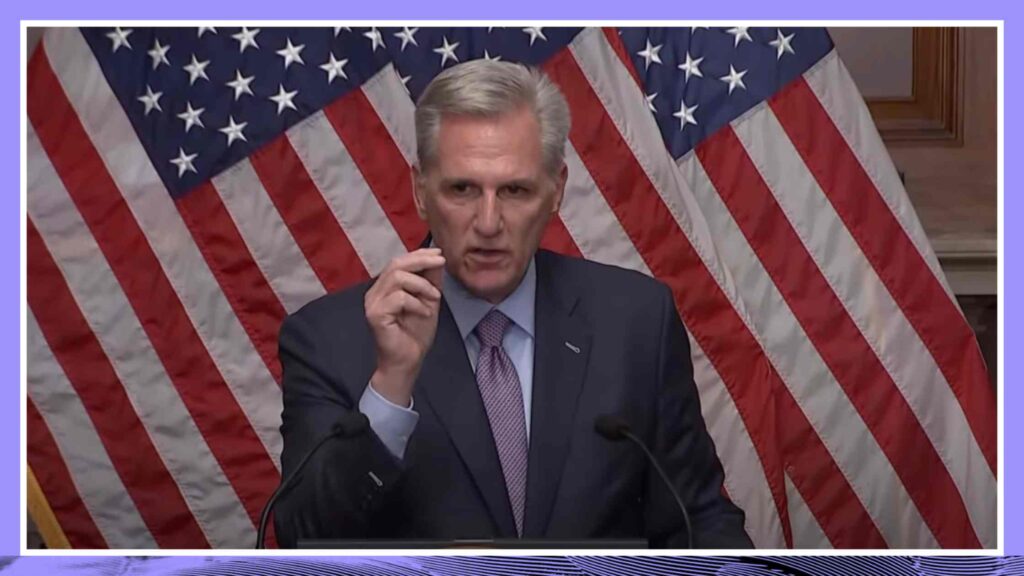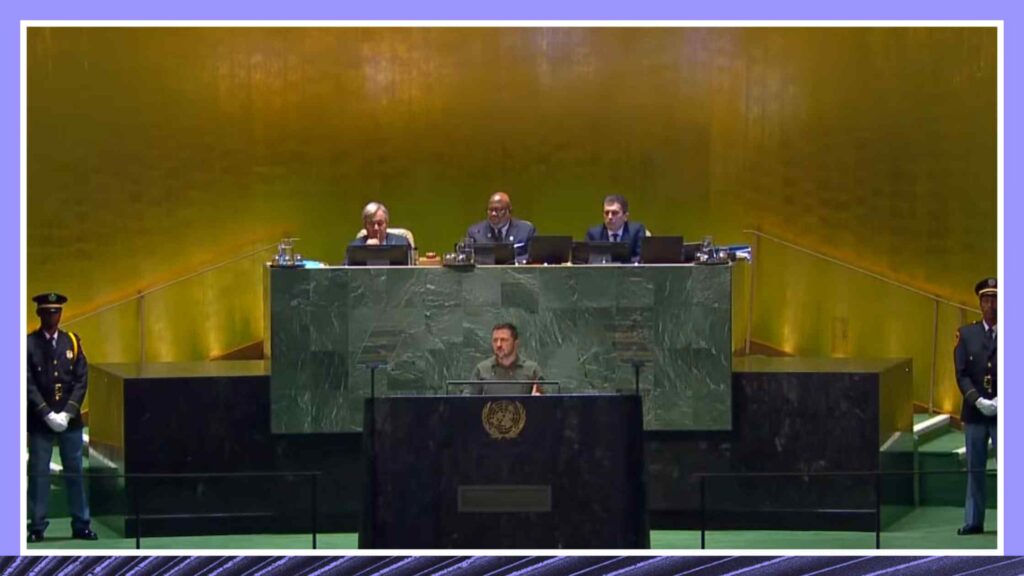Jun 3, 2021
Kamala Harris High-Speed Internet Access Speech Transcript

Vice President Kamala Harris, Secretary Gina Raimondo, and Secretary Deb Haaland spoke about investing in high-speed internet access on June 3, 2021. Read the transcript of the speech remarks here.
Transcribe Your Own Content
Try Rev and save time transcribing, captioning, and subtitling.
Shannon Holsey: (00:00)
And I am also the Treasurer of the National Congress of American Indians. It’s a privilege and honor to be here today with Secretary Haaland, Secretary Raimondo, and the vice president of the United States. There are over 574 federally recognized tribal nations within the United States that are rich in geographic, political and cultural diversity. Like all other governments, tribal nations and elected tribal leaders like me strive to ensure the health and the wellbeing of our citizens and all who dwell among our community. Unfortunately, for decades, the federal government has recognized that Indian country has had substandard infrastructure in every sector. The statistics are harrowing. 70% of American Indian and Alaska Natives are homeless or in need of repair. 48% of American Indian and Alaska Native households lack access to clean water. And approximately 40% of American Indian and Alaska Native households lack broadband.
Shannon Holsey: (01:11)
This existing crisis has created disparities that has led American Indian and Alaska Natives communities in having at times the highest per capita of COVID-19 infection, hospitalization, and a death rate in the United States. I know as leaders in our community, we have all experienced firsthand the devastating impacts and inadequate infrastructure that it has on our community members and our economies. The COVID-19 pandemic has not only made these needs clear. Expanding broadband access, which transform native communities, promote economic development and empower tribal nation governments to provide critical services, including healthcare, education, public safety and emergency services. Like many tribal nations across America, the reality is there are widespread patches of absolutely no connectivity, which creates even more vulnerability in tribal communities like mine and all across America.
Shannon Holsey: (02:25)
For my nation, even for areas that did have access to broadband, there was no connectivity or it was well below the minimum standard to efficiently operate and address our significant needs. My nation collaborated with our local telephone company to install 20 miles of fiber optics to help begin to stabilize our tribal nation. And although this is a good start, the American Rescue Plan will afford my nation the ability to expand and to continue and fill that gap of the digital divide and not hinder tribal communities like mine.
Shannon Holsey: (03:04)
With that said, I am absolutely thrilled to be here with you today and to share President Biden’s job plan, The American Jobs Plan, that will invest the resources directly to tribal communities across the country to combat the disparities that our people face. Thanks to President Joe Biden and Vice President Kamala Harris, my community and others like mine are finally being heard and our long standing infrastructure issues are being addressed. I am thrilled that President Biden has asked Vice President Harris to lead this charge to expand broadband across our nation. Indian country is 100% behind you and look forward in working through strong partnerships with the Biden-Harris administration. Expanding broadband to our communities is just not a game changer. It’s a life changer to tribal communities like mine and the 574 other tribes across the United States. Once again, it is my honor to be here today with you and now it is my distinct honor and privilege to introduce the vice-president of the United States.
Vice President Kamala Harris: (04:29)
Well, thank you Madam President. Good morning to everyone. Secretary Gina Raimondo, Secretary Deb Haaland, I want to thank you both on behalf of the president and myself for your leadership. I have watched closely as you have taken the helm at the Department of Commerce and the Department of the Interior respectively, and I see how dedicated you have been throughout your careers to improving the lives of the American people, of all people. Thank you. And thank you President Shannon Holsey for that kind introduction. Our nation to nation relationship is of utmost importance to me and to President Joe Biden. And here’s the truth. Indigenous communities have shaped our nation throughout our history. Native Americans have defended our nation as members of the military, built up our nation as entrepreneurs and educators, enriched our nation as artists and academics, and kept our nation safe by providing access to the COVID-19 vaccines.
Vice President Kamala Harris: (05:38)
And yet, we know that disparities, deep disparities persist in tribal communities. Disparities in pay for native American women, disparities in education for native American students, disparities in healthcare for native American families, barriers to voting from members of tribal nations and barriers to affordable and accessible high speed internet on tribal lands. Last month, I met with several community leaders to discuss the need for high speed internet in their communities. They came from urban and rural areas and Indian country. They represent parents, students, farmers, and tribal leaders. In fact, Dr. Aaron Payment, the chairperson of the Sault Ste. Marie Tribe of Chippewa Indians joined me that day. He described how broadband infrastructure runs through tribal lands as well as other private and federal lands, which makes it difficult for tribes to ensure high-speed internet gets to their members.
Vice President Kamala Harris: (06:50)
In fact, he said, “Tribes have,” and I quote, “Checkerboard reservations across rural internet deserts,” meaning it’s just not straight through. In fact, according to Chairperson Payment, across his tribes service areas, nearly 40% of people lack access to high-speed internet, 40%. And the lack of reliable access has resulted in a lack of vital services. And we know that, almost everyone through the pandemic has understood that access to internet creates access to services. So lack of access to services means a lack of access to vital needs that families and individuals have. And then compounding the disparities that persist. The disparities that existed before compounded by what we saw during the pandemic and of course what we must do then going forward understanding this is not just an intellectual conversation about access to technology, it’s about access to education, it’s about access to healthcare. So Chairman Payment said that tribes are being left behind, and he’s right, and we must do something about that. And that is why we are here today.
Vice President Kamala Harris: (08:12)
In December of 2020, Democrats and Republicans in Congress worked together to pass COVID-19 relief legislation. And I was in the Senate at the time, and it was abundantly clear that broadband infrastructure had to be part of the bill. Why? Well, it’s probably obvious, because it was abundantly clear that the pandemic had accelerated the digital divide. Just think about it. As some Americans have been able to connect to high speed internet for school and for health and for work and to run their businesses and see their families, many others across the country, including those in rural and tribal communities, have indeed been left behind. In fact, one in three Americans who live in rural areas and on tribal lands lack access to high speed internet. So, Congress worked together as it should across aisles and chambers to include nearly $1 billion for tribal broadband infrastructure programs in our bill.
Vice President Kamala Harris: (09:20)
And today, I am proud to announce that those funds are available for use. Thanks to the great work of Secretary Raimondo and the Department of Commerce, tribes are now eligible for grants that will help improve access to high-speed internet on tribal lands. These funds can be put toward laying down fiber optic cables, and that’s jobs. They can be put toward digital literacy programs so that people know how to get the most out of the internet, because let’s be clear. You can have access to internet, it could be affordable, but if you don’t know how to maximize its use, then that means we’re not maximizing the potential that it has to help individuals and families. And these resources can also be put toward apprenticeships and job training for line installers and fiber splicers and equipment installers. So these are the jobs that are being created but also the skills that will be developed, and our initiative supports that skills development.
Vice President Kamala Harris: (10:22)
And let’s not forget these funds are in addition to the American Rescue Plan’s historic investment in our tribal nations, the largest made in our country’s history, and the president and I are particularly proud of that. Our nation is making significant progress in fulfilling our government’s obligations to tribal nations. At the same time, I want to be clear about this round of funding for broadband infrastructure. It is a down payment on the work we must do. We must keep going until we connect every American household. With the American Jobs Plan, President Joe Biden and I are determined to get to 100% coverage, meaning everyone gets covered. Our plan would create good jobs, building up world-class broadband infrastructure in every community. It would increase competition and reduce costs so that every American, no matter where they live, no matter how much they can pay, would be able to access high-speed internet at home.
Vice President Kamala Harris: (11:32)
This is fundamentally how we create good jobs and economic opportunity. This is how we help our students succeed, our small businesses thrive and our nation compete in the 21st century, and we can get this done. So today’s announcement is proof of that. In December, Congress worked together to expand broadband infrastructure in rural areas and on tribal lands. Now, Congress must work together again to bring high-speed internet to every American.
Vice President Kamala Harris: (12:08)
So I’ll end today with one last point that was made by Chairperson Payment. He said that during the pandemic, folks who are battling opioid addiction, including his own niece, struggled to get the treatment they need. And when COVID-19 hit, the help they had come to rely on at tribal healthcare centers, well, it was gone in an instant and they needed to be able to get online to access that care, but a lack of internet access meant the difference in many cases between recovery or addiction, between life and death. America high-speed internet is a lifeline and there is work left to do to ensure that we are all connected. So let’s celebrate this announcement today and then let’s get back to work tomorrow. And thank you. And now I’m going to hand it over to Secretary Gina Raimondo.
Secretary Gina Raimondo: (13:25)
Thank you Vice President Harris. Thank you for that introduction and more important, thank you for your amazing leadership on this important issue. I think that we should not only get back to work tomorrow, but we at the Commerce Department will continue to work today because today’s the day that we’re launching this new initiative and tribal lands can apply for this billion dollars. And I want to thank President Holsey for your leadership. And of course, I want to recognize my colleague, Secretary Deb Haaland, for your outstanding leadership.
Secretary Gina Raimondo: (14:05)
When COVID-19 lockdowns began about a year ago, most schools all across America immediately switched to online education, except for those children who didn’t have access to broadband. They weren’t lucky enough to be able to continue to go to school. They had their papers delivered to them at home with a school bus and they went months, if not a full year, without any interaction with the teacher.
Secretary Gina Raimondo: (14:40)
Last month, I met with leaders from the Navajo Nation and I heard their stories, these heartbreaking stories, similar to what the vice-president just shared about those struggling with addiction. I heard the stories of children who were left out and left behind because they couldn’t attend school because they didn’t have access to high-speed broadband. Students at other tribal serving schools had to drive for hours or have their parents drive them for hours to sit in the parking lot of a convenience store to have access to broadband so that they would have a chance to go to school or do their schoolwork.
Secretary Gina Raimondo: (15:24)
The fact of it is, and everyone knows it, in the 21st century economy, broadband access and affordability is essential to everyday life. Think about your own lives. You couldn’t do your jobs. You couldn’t go to the doctor. You children couldn’t go to school if you didn’t have access to broadband. And it isn’t right and it isn’t fair that right now every American lacks basic access to broadband. And the fact of the matter is only half of residents on tribal lands have fixed home internet service. That means half or more don’t. And that means we have a lot of work to do.
Secretary Gina Raimondo: (16:04)
High-speed broadband that all of us take for granted is just simply out of reach for too many Americans, disproportionately those who are non-white and those in a lower income. And the Biden-Harris administration is committed to building back a better, more equitable economy where nobody’s left behind. And so as we come back from the pandemic, now’s the time for historic investments to bring affordable, reliable, high-speed broadband to every single American. And that means everyone, everyone. And that’s why, as the vice president said, President Biden proposed $100 billion dollars in the American Jobs Plan to fully close the digital divide. We believe $100 billion dollar investment will enable us to fully close the digital divide all across the nation.
Secretary Gina Raimondo: (17:01)
And today we’re taking a critical step forward in the direction of ensuring that every American has access to high-speed, affordable, high quality broadband, and that we are announcing a billion dollars in grants to expand broadband to unserved and underserved tribal lands. These grants will help tribal communities participate more fully in today’s modern economy. The grants will be available to eligible Native Americans, Alaska Native, and Native Hawaiian entities for broadband deployment, digital inclusion, workforce development, tele-health and distance learning.
Secretary Gina Raimondo: (17:46)
It’s time to close the digital divide. It’s past time to close the digital divide. And with the announcement today of a billion dollars being put out into the community, we are taking step forward in that direction. I’d like to say thank you to my team at the National Telecommunications and Information Administration, call NTIA. They’ve done a terrific job getting us to today. And they will ensure, working with tribal leaders, that funds are distributed equitably so no fund will be left out.
Secretary Gina Raimondo: (18:21)
As the vice-president said, this initiative, we have designed it to be deliberately flexible. We will be working hand in glove with tribal leaders and partnering with them so that the money will be used in the highest and best ways, depending on what that particular tribal land needs. It could be laying the fiber. It could be for equipment. It could be subsidizing broadband for individuals. It’s not just having access to broadband, it has to be affordable. It could be, as she said, apprenticeships. It’ll be putting people to work on these tribal lands laying fiber. And as we were talking earlier, that gives people hope, hope that they are being seen and listened to when their needs are being met when you see visible signs of progress in your community.
Secretary Gina Raimondo: (19:16)
A healthy and successful Indian country and Indian country economy is at the heart of a prosperous American economy. And federal resources are a critical part of closing the digital divide. But as I said, partnerships play a big role as well. In April, the Department of Commerce hosted a robust tribal consultation with more than 100 participants to learn how we can further tribal self-determination and sovereignty. And I’m so proud that we are joined today by President Shannon Holsey because we need more tribal voices like hers at the table to get the job done. I’m sure you’ll be one of the first in line to file one of these applications. And I look forward to continuing our engagement with tribal partners as we move forward.
Secretary Gina Raimondo: (20:06)
That tribal consultation was the beginning, not the end of our department’s engagement with the community. I’m committed to ensuring broadband access across Indian country. And frankly, I’m grateful to have the leadership of Vice President Harris who is deeply committed to this, who knows firsthand how difficult this can be and whose leadership will enable us to close the digital divide for every American. As the vice-president has said, when people are cut off from high-speed internet, they are cut off from opportunity.
Secretary Gina Raimondo: (20:39)
At the Commerce Department, our mission is to create the conditions for economic growth and opportunity for all Americans and these broadband grants will do just that, create opportunity for all Americans. We’re ready to get to work to make sure that this money gets out as quickly, efficiently and effectively as possible to bring opportunity and close the digital divide for every American. And with that, I’ll turn it over to my colleague, Secretary Deb Haaland, who’s doing a tremendous job facilitating rural broadband expansion on federal properties managed by the Department of Interior.
Secretary Deb Haaland: (21:22)
Thank you so much for that kind introduction, Secretary Raimondo. I’m so grateful to be your colleague and appreciate your incredible hard work providing affordable broadband for every single American. President Holsey, thank you for your tremendous leadership and your guidance on our efforts to ensure that native communities across the country have access to broadband internet. Vice President Harris, it is so inspiring to know that we have a leader who thinks about equity every single day. Your commitment to bring broadband to Indian country will deliver significant and tangible results for tribal communities. I appreciate so much your work to center the voices of those who have gone unrecognized for far too long. And yes, absolutely, high-speed internet is indeed a lifeline.
Secretary Deb Haaland: (22:16)
Thank you to everyone for taking the time to join us today, to be on this call to discuss this critical issue. Today’s announcement marks a major stepping stone in the Biden-Harris administration’s commitment to an all of government approach to ensure the federal government lives up to its trust and treaty responsibilities so that tribes have the self-determination to expand internet access on their land. And importantly, these funds not only go to tribal governments, they go to tribal colleges and universities, tribal organizations, Alaska Native corporations, and for Native Hawaiian homelands. This recognizes that these funds are critical to indigenous communities.
Secretary Deb Haaland: (23:02)
Access to broadband internet unlocks opportunities for education, access to healthcare and economic prosperity. But for generations, a lack of infrastructure investment in Indian country has left tribes further behind in the digital divide than most many areas in our country. As many of you know, I’m passionate about broadband internet access to rural and tribal communities and worked extensively on this issue during my time in Congress. The COVID-19 pandemic put a spotlight on and exacerbated all of the disparities of the digital divide created across Indian country, disparities in lifesaving health and public safety services, telehealth, virtual learning and employment opportunities for native communities.
Secretary Deb Haaland: (23:52)
There are things baked into the system that make it more difficult for tribes to access broadband infrastructure on their land. I remember that I visited the Pueblo of Jemez once and the administrators shared their difficulties in providing resources for their members without high-speed internet access. Then they pointed just beyond the yard of the community center and saw the fiber was already laid. They just didn’t have access to it. It was astonishing. But it didn’t stop there. During the pandemic, I remember seeing photos posted on social media of young kids with their parents or grandparents gathered outside libraries, fast food places, and other public spaces that had WiFi so that they could just do their homework. It reminded me of the times my child and I would drive to a bookstore near our home and sit in the parking lot to do our homework, me during law school and Selma in middle school, because we couldn’t afford internet.
Secretary Deb Haaland: (24:54)
No kids should have to bear the burdens of poverty and no community should be left behind in this digital world. The lack of broadband infrastructure also threatens public safety. It limits the abilities of law enforcement to effectively communicate, and it exacerbates the crisis of missing and murdered indigenous people. If victims and their families can’t access public safety services, if law enforcement can’t coordinate, that is completely unacceptable and a failure to protect these communities. We have a responsibility as a country to build infrastructure that will fuel economic development, keep community safe and ensure everyone has opportunities to succeed.
Secretary Deb Haaland: (25:42)
But we shouldn’t let today be the only opportunity to elevate this issue. President Biden’s American Jobs Plan invest tens of billions of dollars directly in tribal communities across the country, in addition to hundreds of billions of dollars and other investments to which tribal communities are eligible. This includes major investments and long overdue expansion of broadband on tribal land. At Interior, we’re committed to honoring our trust and treaty obligations to tribes and conducting robust consultation when we make decisions like these.
Secretary Deb Haaland: (26:19)
I so look forward to working in partnership with the Commerce Department and our sister agencies to expand broadband access for all communities. These funds are a critical step forward to our collective work in promoting equity, igniting job creation and making sure indigenous voices and businesses aren’t left behind in the digital divide any longer. I’m so grateful that you all were here. Thank you all so much. I’m so excited to see what we continue to accomplish together, and I hope you have a wonderful day. Thank you again.
Vice President Kamala Harris: (26:57)
Thank you Madam Secretary.
Speaker 6: (27:01)
Vice President Harris [inaudible 00:27:02] Spanish as we head to the Northern Triangle?
Vice President Kamala Harris: (27:08)
One of my regrets is that I am not fluent in Spanish and so I have… I will have my conversations in English so as not to embarrass myself.
Speaker 6: (27:23)
Can you talk about any other prep that you’ve been doing ahead of… Thank you.
Transcribe Your Own Content
Try Rev and save time transcribing, captioning, and subtitling.






